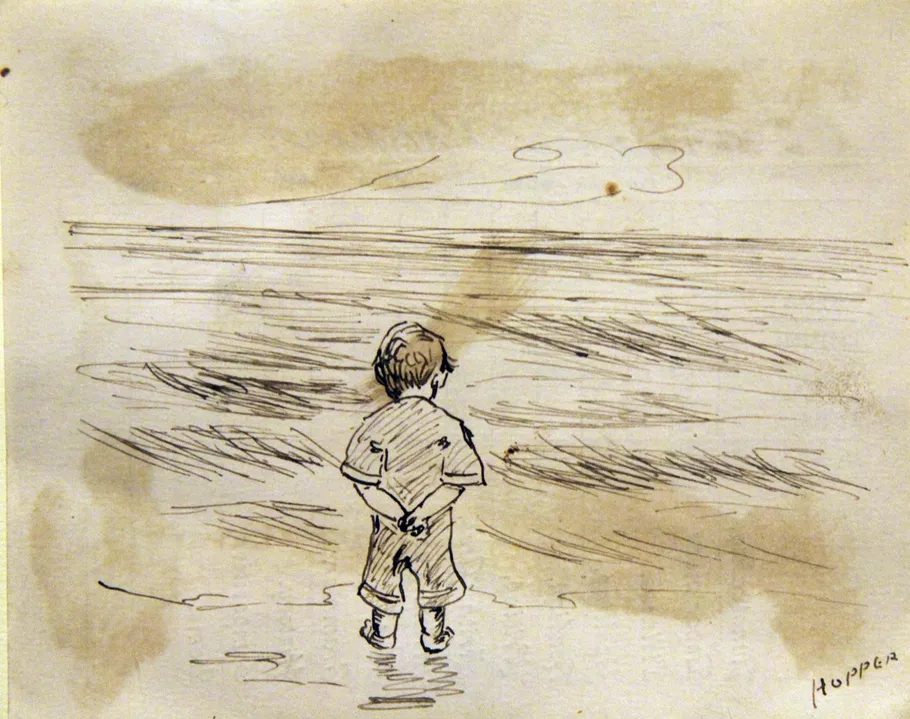And Then The Sky Bled Red
Things started to shatter, the cracks becoming painfully expansive in the days
following the birth of my baby. We were fine, elated even, before our baby was born–at least
I’d like to think so. Tijésùnimí—TJ to most people who’d known him as a child—and I had
decided to wait for two years post-wedding before trying for kids. I’d bumped into TJ nearly
five years ago on the way out of the luxury hospice facility where I’d just dropped Mother off
after her most recent schizophrenic episode. At that moment our eyes locked, and something
had settled beneath my gut—I didn’t know what it was, but I was certain it was there to stay
for the long haul. Sure, he was conventionally beautiful—sporting the typical black guy fade,
full beard and a black stud shining in his left lobe—but it ran deeper than that for me. Perhaps
it was instant infatuation, lust or simply fate pulling me to him—whatever it was, I knew I
would not leave the facility without at least knowing his name. We’d bonded over our mutual
parental care responsibility we’d never imagined adulthood would welcome us into—him
caring for his cancer-ridden father and having spent hours loitering around the facility talking
about our shared—but vastly different—selection of music, literature and movies. We’d spent
the early days of our marriage the happiest versions of ourselves, never once worrying about
family and societal pressure to bear offspring or questioning any underlying medical
condition that would deter us from becoming great parents in the future. Those two years saw
us wrapped up in the love bubble we’d enjoyed before we’d said our I Dos. Ours was a love
that had easily consumed us, almost to the point of damnation and for brief moments in our
cocoon–when time seemed to stop and it was just us–I’d questioned the reality of bringing
kids into the safe mix we’d built for ourselves. I never told TJ any of this, for fear it would
lead him to question whether he’d made the right choice with me. TJ wanted kids–the whole
half a dozen of them–and the idea in and of itself was terrifying, I’d come to admit.
“Kéjì,” He would murmur when we lay satisfied beneath the rumpled sheets, tracing
a finger along my naked back with a lazy smile on his face. “Can you imagine it? Tiny hands,
tiny feet running all over the house…”
It was his dream and the next automatic step after our two years of trifling about was
up. I would smile, wearing a perfectly crafted form of excitement whenever he would bring
the topic up, even though everything within me screamed against the very idea. But then
somehow–as if by a stroke of magic–I began warming up to the idea. Having a mini-
me–someone who could and would become my best friend. Tiny hands, tiny feet like he’d
said. I could see the full picture and for the first time, I felt a fraction of the flutters of
excitement he proudly wore. So when a missed period and a series of over-the-counter tests
confirmed her existence to me, I must confess, my fears took precedence over any elation I’d
once felt at the idea.
But we were fine.
“She’s crying, Kéjì.” TJ’s tired voice breaks through the tumultuous thoughts holding
me captive. I stare at him but don’t really see anything. It’s been like this for weeks, staring
but not seeing. It was all my life amounted to these days. Staring at her. Glaring at him.
Wondering. Pondering. Envisioning what a life without her would look like. It was in those
moments the voices in my head became louder than any emotional attachment I was
supposed to feel towards her. They would tell me to shove her little body under the bathtub
until the curling sounds of gargling water becomes louder than her already piercing wails.
They’d remind me that I’d had inhibitions about bringing her to the world anyway,
whispering to me how she’d always be in danger anyway and I was the only one capable of
freeing her from a lifetime of pain. On some days I looked at her and agreed with them–my
mind yanking me back to painful memories of my schizophrenic mother who’d smashed my
hand against the burning stove, convinced I was one of the demons her pastor had warned her
about. Other days, I was more angry. At myself, at the world and at them. Those were the
days I told myself I would rather take my own life than listen to their suggestions. Those
days, ending my own existence seemed like a more rational solution than spending another
day in unending pain. They would talk, but I would in turn shut my ears to them, screaming
their demands right back at TJ in the night, telling him to make them stop, pleading with him
that I just wanted it to end, with hopes that it would silence them for good. And while I
enjoyed some reprieve from them, they would usually return in violent vengeance. So it was
easy to stay still, stare—holding myself back but not making a conscious decision to tune
them out—just wondering and waiting until things started to make sense again.
I see my emotions in colour–I could tell you the days when the colour of my soul was
a dull grey, or how the orchestra of my thoughts on a happy day translated to a sunshine
shade of orange. Yet, a week after her birth, I could no longer picture my soul’s colour.
Everything had become a boring pitch black. It was like time had stilled and my life suddenly
had no meaning other than this maternal responsibility that had been forcibly shoved into my
arms. In that first month after her birth, I was neither happy nor sad–my emotions engaging in
a weird tug of war, oscillating between the extremes and the middles. I pretended to be happy
for the sake of everyone around me, attaching platitudes about how much I’d always dreamt
of becoming a mother–and other phrases I’d heard new mothers say when referring to their
newborns–whenever strangers and wellwishers alike would come around. I would plaster
smiles in public, loudly proclaiming how much I loved my baby girl to the world. I knew
what happiness looked like for me, but I’d apparently become that good of an actor because
to everyone else–TJ included–I was overjoyed. The biggest parts of me, though, spent more
time watching and wondering, imagining what my life would look like if I’d chosen not to
have her.
“Are you not going to pick her up today again, Kéjì?” I can sense that TJ is becoming
more exasperated with me each passing day.
His sighs have become louder and punchier, movements rash and angry even though
he works well to hide it. At first, he’d spend every waking hour asking if everything was
okay, perhaps inwardly questioning my inability to be a mother to our baby, and my constant
choice to walk away from her wails. In the first few days, he’d chalk it all up to stress,
wearing an understanding smile on his face anytime I crawled under the heavy beige blankets
in our room, hiding from motherhood and the rest of the world. He’d rub my back, peppering
me with what was supposed to be soothing murmurs of pele, a word which only further drove
home the point that being my baby’s mother was a mistake. Because unfortunately, the world
gave my baby the cruellest form of punishment imaginable from the day she was born—me
as her mother. Later on, his stares became heavier, more pronounced and prolonged, tilting
his head as he watched me for the umpteenth time in my signature baggy sweater and shorts
tuck my frame under the blankets, wondering if his wife was a monster. Because only a
monster would blatantly shove her own crying baby away, unable to soothe and care for her
as any normal person would.
It was the first time I could admit that perhaps I had always been like my mother and
my baby had unearthed this long-existing truth.
I’d hear the closed-door conversations he had with his mother these days, who had
come in last month for omugwo1
since my mother was mentally incapable of doing so. The
wooden floorboards in his room would creak loudly, a telltale sign of his back-and-forth
pacing, his mother’s steps heavier before stopping at what I assume is his reading chair. She
had never been good at whispering and maintaining concealed conversations, because her
soft voice would ring loudly, seeping through the walls before getting to my ears, “Iyawo
yi… emi okunkun ti gbe wo2
. Abi maybe we need to call Woli. Woli has seen this type of thing
before, I’m sure. He’s the only one that can help.” TJ would scoff loudly, before
remembering the supposed secrecy of the conversation, forcing him to lower his voice before
responding: “Don’t talk like that, Mama. Kéjì is not possessed. She just has…she just has
baby blues. She’ll be fine.”
That was what we were calling it now. Baby blues. A brilliantly crafted but elusive
way of describing my shortcomings. Whether it was or wasn’t, none of it was my business.
They could define it in any way that satisfied their innate desire for labels, but it did not stop
me from feeling as though our baby had brought with her a lot more despair in my life than
the peace the world claimed children brought. In the middle of my sadness, I want to dig into
my core and pull the well of emotions whatever deity that created me put in there, stare at it
point blank and ask why. Why are you so messed up? But maybe it had always been in my
destiny. My kadara3
—the spiritual explanation as to why destinies were inherently
different—was not good and the head on my shoulders, as passed down from my
schizophrenic mother and deadbeat dad, was not meant to function in the normal capacity as
everyone else’s was. After all, just like his mother had said, an evil spirit may have carried
me away.
Every day, I try to tell myself it’ll be a better day than the previous one. Every day,
muttering those same words, wanting to believe the truth in them.That I’ll feel those flutters
of excitement anytime I look at our baby. That I’ll finally hold her close to my heart and
allow her breathe life back into it. But every day, the voices in my head—now become my
trusted companions—remind me that those words are well-constructed lies. So I spend the
rest of my days screaming silently, envying TJ who seemed to have it all together.
I did not give my baby a name. Maybe TJ and his mother had, but at the moment the
doctors had pulled her towards me, wrapped in the stench of antiseptic, I could only stare.
And in this moment, I watch as her face reddens from the force of the screams she pushes
out, tiny hands and feet flailing about, reaching out and grasping nothing but air and for a
second I imagine what my life would look like if I simply walk away and let her continue
crying. It reminds me of a time, not too long ago, when TJ accused me of wanting to kill our
baby. The truth is that was not what happened. It was TJ’s rather exaggerated retelling of
events. He says he caught me standing, watching as our baby girl gasped desperately for air
that first time, her shrills painful as her little hands struggled to cling to mine which were
anxious to let her go. TJ says the blank look he’d seen on my face as she sunk lower before
he’d yanked her out from the tub—bemoaning a panicked what is wrong with you as he
picked a threadbare towel on the rack to swaddle her in—terrified him. He says it was the
first time he questioned whether something was wrong with me like I’d claimed in rare
moments of lucidity.
I do not remember any of it, rather, I know I was overcome with the desperate need
for the noise to stop–an incessant desire to quieten not just the outside noise but the soul-
wrenching ones inside. It was all I spent most parts of my days thinking about, consumed
1 An traditional custom, historically Igbo custom, for postpartum care typically undertaken by the mother-in-
law.
2 English Translation: Your wife…an evil spirit has carried her away (or she is possessed).
3 Kadara means destiny .
with a craving to not conform to this role of motherhood—taking care of a tiny human while
forcefully swallowing my own needs— that the world was trying to force on me.
“Kéjì, this has gone on for too long,” He finally picks her up from the cot he’d stashed
her in under an hour ago in the living room where we’d all been sat–with him watching me
watch her. He no longer calls me One KG, the nickname he’d given me the first few weeks
after we’d started dating, attributed to my whining about losing and gaining exactly one
kilogram every week. He would cup my face, peering into my eyes as though it held the
secrets of the world in it and murmur, “OneKG or not, you’re sexy as hell.” Perhaps he no
longer found me attractive enough since our baby was born.
“You don’t call me OneKG anymore.” I blurt out, poking the beds of my cuticles as I
tuck both my feet under me on the couch. “Do you not find me sexy again like you’d always
claimed?”
He sharply turns to me, our baby thrown across his right shoulder as his left hand pats
down her back, his coos drowning her fits, soothing her into what I hope is another hour of
noiseless sleep. “What are you talking about, Kéjì? The last time I did, last week, you
screamed at me to stop.”
“Really?” I lift my eyes to meet his. They’re filled with varying emotions, but I latch
on to one I can recognise–pain–because the hope I see shining there scares me. I can tell that
some part of him wants me to stand up, reach out for our baby and do the mundane job of
rocking her to sleep, but what he does not realise is that I’d rather her gone and be the one
pulled to sleep instead. I do not tell him any of that, instead, I return to another conversation.
“Has your mum gotten back from the market?”
He sighs again. It seems as though this time around, TJ has given up. “Did you not
hear what I said about the OneKG comment?”
I did hear. But what’s the point in rehashing a long forgone point? How do I tell him I
do not remember many of what appears to be my unending tantrums these days? I do not
remember any of it. I do not remember a lot of things from the first few weeks since my
baby’s birth. I do not remember his mother coming around, but her presence has been stifling,
like a tight coil wrapped around my neck, hawk eyes watching my every movement in ways
that make my skin crawl. We had always had a rather cordial relationship, but my lack of care
for our baby has only worsened it. Each day, she would care for her as though she were her
mother, only leaving our baby in TJ’s hands when it was time to go out for her market runs.
Those were the only times it felt like my mind could breathe freely. It’s why I would always
ask him each day whether she had returned from the market—not because I cared so much
about her welfare, but because I needed to know whether my time for solitude was cut short.
“I’m hungry,” I respond simply, tugging at the loose threads that have now burst out
from the seams of my sweater from overuse. It’s funny, it would have bothered me in the
past, the swaying of the strings compelling me to either take a scissor to them or discard the
sweater entirely. But it’s different now.
Things are different now.
Her excited chortle and TJ’s booming laughter force my attention away from the arm
of my sweater. Her excitement bleeds from the sockets of her eyes down the apples of her
cheeks and onto the white of her overall. I watch them, begging for the flutters I’d felt before
her birth to let loose. I will my heart to thud alive once more, my hands to reach out to her
and feel the smoothness of her skin TJ had once gone on about.
But nothing. I feel nothing.
Contributor’s Bio
Oluwabunmi “ Bunmi” Adaramola works in academia by day and spends the rest
of the time in her imagination, concocting hilarious and romantic scenarios. Keen to develop
her writing skills, she completed an online Creative Writing Specialisation at the renowned
Weslyean University, a top liberal arts college in the US, a Transmedia Writing Course at
Michigan State University and a Storytelling and Communication course from Maguire
University.
Her short story, Palmwine Promises was featured in Brittle Paper’s 2023 Festive
Anthology. Her other short stories appear in Brittle Paper
,
The Kalahari Review
,
The African
Writer, The SprinNG Literary Movement (forthcoming) and elsewhere. Her short story, How
to Kill a Single Yoruba Woman will be published as part of KepressNG’s 2024 Anthology.
She has an unhealthy coffee addiction and is an unrepentant bibliophile with an
overwhelming stack of cheesy romance novels.



